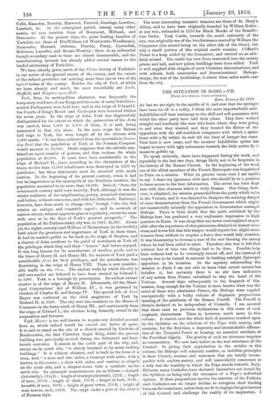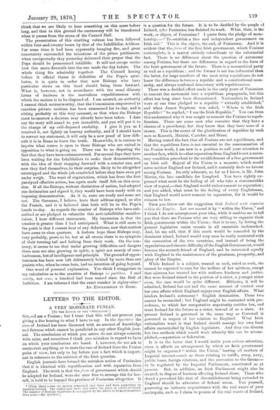THE SITUATION IN ROME.—VII.
[FROM OUR SPECIAL CORRESPONDENT.]
Rome, January 23, 1870. AT last we are right in the middle of it, and now that the springes have been let off in a volley, I think the most imperturbable anti- Infaffibilist will bear testimony to the skill and self-possession with which the other party have laid their plans. They have walked straight and resolutely like men who knew where they were going to and what they wanted, and they treated the flutter of the opposition with the self-confident composure with which a spider bears with a fly within its web till the hour of hunger has come. That hour is now come, and the monster Infallibilist spider has begun to move with ugly seriousness towards the little active fly it means to gobble up.
To speak seriously, there have happened during the week, and especially in the last two days, things likely not to be forgotten in the history of the Roman Church. In the beginning of the week one of the ablest members of the French Episcopate was despatched to Paris on a mission. What its precise terms were I am unable to say. I share my ignorance with men who should be in a position to have access to the best information. The secret has been kept here with that closeness which is truly Roman. One thing, how- ever, is admitted, the mission proceeded from the party which rules in the Vatican, and it was directed to dissipate the seeming danger of some demonstration from the French Government which might not immaterially intensify the opposition in fermentation amongst Bishops. There is little doubt that the spirit exhibited by the Bishops here has produced a very unpleasant impression in high quarters in Rome. It was altogether one never contemplated as pos- sible after the experience of obsequiousness obtained on former occa- sions, and it was felt that this temper would require but slight coun- tenance from without to acquire a force that would defy coercion. It was threatening to become a case of the seer blessing the enemy whom he had been called to curse. Therefore also was it felt that without loss of time two things had to be done. Possible help from without had to be cunningly staved off, and the interval of respite was to be turned to account in burking outright Episcopal opposition in its isolation. In the mystery surrounding the mission to Paris I am not able to learn what actual success has befallen it, but certainly there is no stir here indicative of any action from France calculated to stay the hand of the Vatican. Several days subsequently to the despatch of this mission, long enough for the Vatican to have known what was the mind of those who administer France, the Bishops were regaled unexpectedly with a bulky volume of dogmatic propositions treating of the attributes of the Roman Pontiff. The Pontiff is therein declared to be independent of Councils. I am assured that there exist no previous declarations in this sense of such emphatic distiuctness. There is, however, much more in this volume. It travels over the whole field of questions touched upon by the Syllabus on the relations of the Pope with society, and contains, for the first time, a dogmatic and unmistakable affirma- tion of the Temporal Power as forming an essential attribute of the Pontifical dignity. The gravity of such an utterance requires no commentary. We now have before us the real substance of the Council. In giving their approbation to the articles in this volume, the Bishops will solemnly confirm, as indelible principles in their Church, maxims and sentences that are totally incom- patible with modern society, and will unavoidably consecrate as a holy war the hostility in which the Pope stands towards Italy. Hitherto many Catholics have declared themselves not bound by the Syllabus, as being only the utterance of a Pope's individual opinion. If these propositions receive the sanction of the Fathers, such Catholics can no longer decline to recognize their binding force on the conscience, unless they see fit to impugn the genuineness of this Council and challenge the reality of its inspiration. I think that we are likely to hear something on this score before long, and that to this ground the controversy will be transferred when it passes from the arena of the Council Hall.
The presentation of this startling volume has been followed within four-and-twenty hours by that of the Infallibilist Address. For some time it had been apparently hanging fire, and great uncertainty surrounded the intentions of the prime petitioners, when unexpectedly they yesterday delivered their prayer that the Pope should be pronounced infallible. It will not escape notice how this more dovetails into the one made the day before. The whole thing fits admirably together. The Council having
before it official theses in definition of the Pope's attri- butes, it is quite in order that now Bishops who have particular views on this head should bring them forward. What is, however, not in accordance with the usual dilatory forms of business is the marvellous expeditiousness with which the motion is to be disposed of. I am assured, on authority I cannot think untrustworthy, that the Commission empowered to sanction private motions has been summoned for to-day, and is sitting probably at this very moment, so that when the Bishops meet to-morrow a decision may already have been taken. I dare say the story will sound to you incredible, and you will put it to the charge of my evil-disposed credulity. I give it you as I received it, not lightly on hearsay authority, and if I should have to correct my statement, it will only be a new proof of how diffi- cult it is in Rome to learn the truth. Meanwhile, it is curious to inquire what course is open to those Bishops who are united in opposition to what is going on. There can be no disputing the fact that they have been outmanceuvred. For several days they have been waiting for the Infallibilists to make their demonstration, with the idea of their stepping forward with a counter one, and now they find themselves, to their surprise, likely to be altogether outstripped and the whole job concluded before they have even got under weigh. The want of organization, which has from the first paralyzed effective action, has again made itself felt on this occa- sion. If all the Bishops, without distinction of nation, had adopted one declaration and signed it, they would have been ready with an imposing demonstration. As it is, some are ready and some are not. The Germans, I believe, have their address signed, as also the French, and it is believed that both will be in the Pope's hands to-day. As regards the number of Bishops who have sub- scribed or are pledged to subscribe this anti-iufallibilLst manifes- tation, I hear different statements. My impression is that the number is greater than I had anticipated. What is still more to the point is that I cannot hear of any defections, now that matters have come to close quarters. A forlorn hope these Bishops may, very probably, prove to be, but at all events there is no symptom of their turning tail and bolting from their work. On the con- trary, it seems to me that under growing difficulties and dangers these men are also growing in spirit, a spirit not merely of com- bativeness, but of intelligence and principle. The ground of oppor- tuneness has been now left deliberately behind by more than one prelate who, when he came here, had no intention of going beyond. One word of personal explanation. You think I exaggerate in my calculation as to the creation of Bishops in partibus. I said early, not over, a hundred had been named since the Bull of Indiction. I am informed that the exact number is eighty-nine.* AN ENGLISHMAN IN ROME.



































 Previous page
Previous page